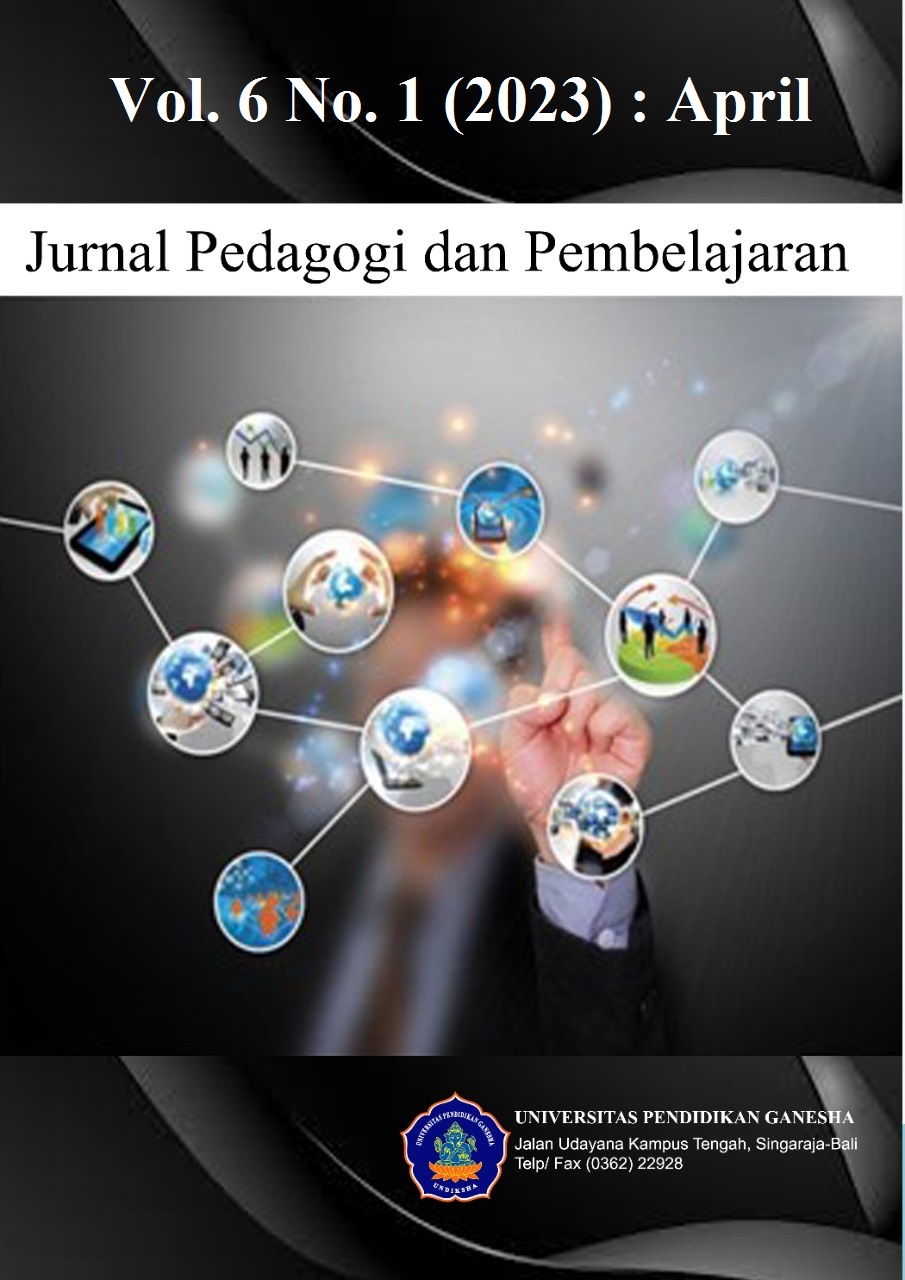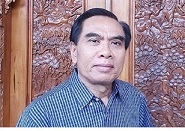Character Education of Tolerance and Love for the Homeland in the Independent Study Curriculum in Junior High Schools
DOI:
https://doi.org/10.23887/jp2.v6i1.57832Keywords:
Tolerance, Love for the Motherland, Freedom CurriculumAbstract
The low values of the character of tolerance and love for the homeland in students today are due to the lack of application and instilling the character values of tolerance and love for the homeland in everyday life and the school environment. This study aims to assess and measure the character of tolerance and love for the motherland in supporting the independent learning curriculum. This research belongs to the type of quantitative research with a descriptive approach. The population in this study was 183 junior high school students, with a sample of 165 students who filled out the questionnaire. Data collection in the study was carried out using the questionnaire method, with the research instrument in the form of a closed questionnaire presented in the form of questions. The data obtained in the study were then analyzed using descriptive statistical data analysis techniques. The results of the data analysis show that the characters of tolerance and love for the homeland of class VII1, VII-5, VIII-2, VIII-4, IX-1, and IX-4 are students of class VII-1, as much as 97.93% and the percentage for The character of love for the country is 94.82%, the character for tolerance for class VII-5 has a percentage of 90.31%, the character for love for the country for class VII-5 has a percentage of 89.68%, for class VIII-2 the percentage of character values for tolerance is 93.33 %, for class VIII-2 the percentage of love for the motherland is 83.8%, for class VIII-4 the character for tolerance is 85.66%, for class VIII-4 the character for love for the country is 81.66%, for class IX-1 character tolerance as much as 93.07%, class IX-1 the character of love for the country as much as 94.23%. The results of the percentage of class IX-4 on the character of tolerance have a percentage of 97.66%. Based on the results of this analysis, it can be concluded that the characteristics of Tolerance and Love for the Motherland in Supporting the Free Learning Curriculum are very good.
References
A’la, M. (2019). Penguatan Karakter Toleransi Melalui Permainan Tradisional Dalam Pembelajaran PJOK di Sekolah Dasar. MAGISTRA: Media Pengembangan Ilmu Pendidikan Dasar Dan Keislaman, 10(2), 130. https://doi.org/10.31942/mgs.v10i2.3108. DOI: https://doi.org/10.31942/mgs.v10i2.3108
Atika, N. T., Wakhuyudin, H., & Fajriyah, K. (2019). Pelaksanaan Penguatan Pendidikan Karakter Membentuk Karakter Cinta Tanah Air. Mimbar Ilmu, 24(1), 105. https://doi.org/10.23887/mi.v24i1.17467. DOI: https://doi.org/10.23887/mi.v24i1.17467
Audina, D., Soleh, D. A., & Sumantri, M. S. (2022). Pendidikan Karakter Cinta Tanah Air dan Kedisiplinan Dalam Kegiatan Upacara Bendera di Sekolah Dasar DKI Jakarta. EduStream: Jurnal Pendidikan Dasar, 5(1), 60–68. https://doi.org/10.26740/eds.v5n1.p60-68. DOI: https://doi.org/10.26740/eds.v5n1.p60-68
Baharuddin, M. R. (2021). Adaptasi Kurikulum Merdeka Belajar Kampus Merdeka (Fokus: Model MBKM Program Studi). Jurnal Studi Guru Dan Pembelajaran, 4(1), 195–205. https://doi.org/10.30605/jsgp.4.1.2021.591. DOI: https://doi.org/10.30605/jsgp.4.1.2021.591
Chita, A., & Harahap, P. (2019). CHARACTER BUILDING PENDIDIKAN KARAKTER. Jurnal Pendidikan Dan Konseling, 9(1), 1–11. https://doi.org/10.30829/al-irsyad.v9i1.6732.
Daga, A. T. (2021). Makna Merdeka Belajar dan Penguatan Peran Guru di Sekolah Dasar. Jurnal Educatio FKIP UNMA, 7(3), 1075–1090. https://doi.org/10.31949/educatio.v7i3.1279. DOI: https://doi.org/10.31949/educatio.v7i3.1279
Dahniar, A. (2020). Memahami Pembentukan Sikap (Attitude) Dalam Pendidikan Dan Pelatihan. Tatar Pasundan : Jurnal Diklat Keagamaan, 13(2), 202–206. https://doi.org/10.38075/tp.v13i2.27. DOI: https://doi.org/10.38075/tp.v13i2.27
Fahmi, F., & Bitasari, W. (2021). Revitalisasi Implementasi Kurikulum Pendidikan. Al-Fikru: Jurnal Ilmiah, 14(2), 81–91. https://doi.org/10.51672/alfikru.v14i2.30. DOI: https://doi.org/10.51672/alfikru.v14i2.30
Fitriani, S. (2020). Keberagaman dan Toleransi Antar Umat Beragama. Analisis: Jurnal Studi Keislaman, 20(2), 179–192. https://doi.org/10.24042/ajsk.v20i2.5489. DOI: https://doi.org/10.24042/ajsk.v20i2.5489
Fitriyani, F. (2019). Konsep Organisasi Pendidikan dalam Pemberdayaan Sekolah. EL-Ghiroh, 17(02), 61–80. https://doi.org/10.37092/el-ghiroh.v17i02.105. DOI: https://doi.org/10.37092/el-ghiroh.v17i02.105
Hakiky, N., Nurjannah, S., & Fauziati, E. (2023). Kurikulum Merdeka Dalam Perspektif Filsafat Konstruktivisme. Jurnal Penelitian Guru Indonesia, 3(2), 194–202. https://doi.org/10.58578/tsaqofah.v3i2. DOI: https://doi.org/10.58578/tsaqofah.v3i2.887
Hartanto, S. B. (2019). Manajemen Pendidikan Karakter Cinta Tanah Air (Analisis Konseptual Peran Kepala Sekolah dan Guru). Wahana Islamika: Jurnal Studi Keislaman, 5(2), 49–65. https://doi.org/10.5281/wahanaislamika.v5i2.68.
Hendrawan, J. H., Halimah, L., & Kokom, K. (2022). Penguatan Karakter Cinta Tanah Air melalui Tari Narantika Rarangganis. Jurnal Basicedu, 6(5), 7978–7985. https://doi.org/10.31004/basicedu.v6i5.3716. DOI: https://doi.org/10.31004/basicedu.v6i5.3716
Indarta, Y., Jalinus, N., Waskito, W., Samala, A. D., Riyanda, A. R., & Adi, N. H. (2022). Relevansi Kurikulum Merdeka Belajar dengan Model Pembelajaran Abad 21 dalam Perkembangan Era Society 5.0. EDUKATIF : JURNAL ILMU PENDIDIKAN, 4(2), 3011–3024. https://doi.org/10.31004/edukatif.v4i2.2589. DOI: https://doi.org/10.31004/edukatif.v4i2.2589
Indriani, N., Suryani, I., & Mukaromah, L. (2023). Implementasi kurikulum merdeka belajar dalam pembentukan karakter disiplin peserta didik di sekolah dasar. Jurnal Ilmiah Kependidikan, 17(1), 242–252. https://doi.org/10.30595/jkp.v17i1.16228.
Intan, R. (2020). Analisis sikap toleransi belajar IPA siswa sekolah menengah pertama. Penelitian Ilmu Pendidikan, 13(2), 120–128.
Irhamna, I., & Purnama, S. (2022). Peran Lingkungan Sekolah dalam Pembentukan Karakter Anak Usia Dini di PAUD Nurul Ikhlas. Jurnal Pendidikan Anak, 11(1), 68–77. https://doi.org/10.21831/jpa.v11i1.46688. DOI: https://doi.org/10.21831/jpa.v11i1.46688
Jannah, M. M., & Rasyid, H. (2023). Kurikulum Merdeka: Persepsi Guru Pendidikan Anak Usia Dini. Jurnal Obsesi : Jurnal Pendidikan Anak Usia Dini, 7(1), 197–210. https://doi.org/10.31004/obsesi.v7i1.3800. DOI: https://doi.org/10.31004/obsesi.v7i1.3800
Kadarsih, I., Marsidin, S., Sabandi, A., & Febriani, E. A. (2020). Peran dan Tugas Kepemimpinan Kepala Sekolah di Sekolah Dasar. EDUKATIF : JURNAL ILMU PENDIDIKAN, 2(2), 194–201. https://doi.org/10.31004/edukatif.v2i2.138. DOI: https://doi.org/10.31004/edukatif.v2i2.138
Khusni, M. F., Munadi, M., & Matin, A. (2022). Impelementasi Kurikulum Merdeka Belajar di MIN 1 Wonosobo. Jurnal Kependidikan Islam, 12(1), 60–71. https://doi.org/10.15642/jkpi.2022.12.1.60-71. DOI: https://doi.org/10.15642/jkpi.2022.12.1.60-71
Majid, M. F. A. F. (2020). Peran Guru Akidah Akhlak dalam Mengaktualisasikan Sikap Toleransi pada Peserta Didik. Jurnal Pendidikan Agama Islam, 17(1), 67–80. https://doi.org/10.14421/jpai.2020.171-06. DOI: https://doi.org/10.14421/jpai.2020.171-06
Marintan, D., & Priyanti, N. Y. (2022). Pengaruh Pola Asuh Demokratis terhadap Keterampilan Sikap Toleransi Anak Usia 5-6 Tahun di TK. Jurnal Obsesi : Jurnal Pendidikan Anak Usia Dini, 6(5), 5331–5341. https://doi.org/10.31004/obsesi.v6i5.3114. DOI: https://doi.org/10.31004/obsesi.v6i5.3114
Mustaghfiroh, S. (2020). Konsep “Merdeka Belajar” Perspektif Aliran Progresivisme John Dewey. Jurnal Studi Guru Dan Pembelajaran, 3(1), 141–147. https://doi.org/10.30605/jsgp.3.1.2020.248. DOI: https://doi.org/10.30605/jsgp.3.1.2020.248
Nurkholis, N. (2021). Peran Kepala Sekolah dalam Supervisi Pendidikan. INSANIA : Jurnal Pemikiran Alternatif Kependidikan, 26(2), 306–321. https://doi.org/10.24090/insania.v26i2.5612. DOI: https://doi.org/10.24090/insania.v26i2.5612
Pane, A., & Dasopang, M. D. (2017). BELAJAR DAN PEMBELAJARAN. FITRAH:Jurnal Kajian Ilmu-Ilmu Keislaman, 3(2), 333. https://doi.org/10.24952/fitrah.v3i2.945. DOI: https://doi.org/10.24952/fitrah.v3i2.945
Pratiwi, S. I. (2020). Pengaruh Ekstrakurikuler Pramuka terhadap Karakter Disiplin Siswa Sekolah Dasar. EDUKATIF : JURNAL ILMU PENDIDIKAN, 2(1), 62–70. https://doi.org/10.31004/edukatif.v2i1.90. DOI: https://doi.org/10.31004/edukatif.v2i1.90
Purnamasari, Y. M., & Wuryandani, W. (2019). Media Pembelajaran Big Book Berbasis Cerita Rakyat untuk Meningkatkan Karakter Toleransi pada Anak Usia Dini. Jurnal Obsesi : Jurnal Pendidikan Anak Usia Dini, 4(1), 90. https://doi.org/10.31004/obsesi.v4i1.273. DOI: https://doi.org/10.31004/obsesi.v4i1.273
Putra, M. A. D., Rukajat, A., & Ramdhani, K. (2022). Implementasi Pendidikan Karakter dalam Proses Pembelajaran Akidah Akhlak di SMP Negeri 1 Karawang Timur. ISLAMIKA, 4(3), 476–490. https://doi.org/10.36088/islamika.v4i3.1966. DOI: https://doi.org/10.36088/islamika.v4i3.1966
Rahayu, R., Rosita, R., Rahayuningsih, Y. S., Hernawan, A. H., & Prihantini, P. (2022). Implementasi Kurikulum Merdeka Belajar di Sekolah Penggerak. Jurnal Basicedu, 6(4), 6313–6319. https://doi.org/10.31004/basicedu.v6i4.3237. DOI: https://doi.org/10.31004/basicedu.v6i4.3237
Rahmawati, I. Y., Cahyono, H., & Fadlillah, M. (2022). APE Tradisional : Penanaman Rasa Cinta Tanah Air Berbasis Etnomatematika pada Anak Usia Dini. 6(6), 7058–7068. https://doi.org/10.31004/obsesi.v6i6.3512. DOI: https://doi.org/10.31004/obsesi.v6i6.3512
Satrio, S., Hasibuan, L., Anwar, K., & Rizki, A. F. (2021). Administrasi Kurikulum, Kesiswaan, Pendidik dan Tenaga Kependidikan dalam Tinjauan Administasi Sekolah. Indonesian Journal of Islamic Educational Management, 4(2). https://doi.org/10.24014/ijiem.v4i2.13057.
Sopiansyah, D., & Masruroh, S. (2021). Konsep dan Implementasi Kurikulum MBKM (Merdeka Belajar Kampus Merdeka). Reslaj : Religion Education Social Laa Roiba Journal, 4(1), 34–41. https://doi.org/10.47467/reslaj.v4i1.458. DOI: https://doi.org/10.47467/reslaj.v4i1.458
Sujana, I. W. C. (2019). Fungsi Dan Tujuan Pendidikan Indonesia. Adi Widya: Jurnal Pendidikan Dasar, 4(1), 29. https://doi.org/10.25078/aw.v4i1.927. DOI: https://doi.org/10.25078/aw.v4i1.927
Susilawati, N. (2021). Merdeka Belajar dan Kampus Merdeka Dalam Pandangan Filsafat Pendidikan Humanisme. Jurnal Sikola: Jurnal Kajian Pendidikan Dan Pembelajaran, 2(3), 203–219. https://doi.org/10.24036/sikola.v2i3.108. DOI: https://doi.org/10.24036/sikola.v2i3.108
Vhalery, R., Setyastanto, A. M., & Leksono, A. W. (2022). Kurikulum Merdeka Belajar Kampus Merdeka: Sebuah Kajian Literatur. Research and Development Journal of Education, 8(1), 185. https://doi.org/10.30998/rdje.v8i1.11718. DOI: https://doi.org/10.30998/rdje.v8i1.11718
Widiyono, A., & Millati, I. (2021). Peran Teknologi Pendidikan dalam Perspektif Merdeka Belajar di Era 4.0. Journal of Education and Teaching (JET), 2(1), 1–9. https://doi.org/10.51454/jet.v2i1.63. DOI: https://doi.org/10.51454/jet.v2i1.63
Wijaya, A., Mustofa, M. S., & Husain, F. (2020). Sosialisasi Program Merdeka Belajar dan Guru Penggerak Bagi Guru SMPN 2 Kabupaten Maros. Jurnal Puruhita, 2(1), 46–50. https://doi.org/10.15294/puruhita.v2i1.42325. DOI: https://doi.org/10.15294/puruhita.v2i1.42325
Downloads
Published
How to Cite
Issue
Section
License
Copyright (c) 2023 Marwah Nasution

This work is licensed under a Creative Commons Attribution-ShareAlike 4.0 International License.
Authors who publish with Jurnal Pedagogi dan Pembelajaran agree to the following terms:- Authors retain copyright and grant the journal the right of first publication with the work simultaneously licensed under a Creative Commons Attribution License (CC BY-SA 4.0) that allows others to share the work with an acknowledgment of the work's authorship and initial publication in this journal
- Authors are able to enter into separate, additional contractual arrangements for the non-exclusive distribution of the journal's published version of the work (e.g., post it to an institutional repository or publish it in a book), with an acknowledgment of its initial publication in this journal.
- Authors are permitted and encouraged to post their work online (e.g., in institutional repositories or on their website) prior to and during the submission process, as it can lead to productive exchanges, as well as earlier and greater citation of published work. (See The Effect of Open Access)













